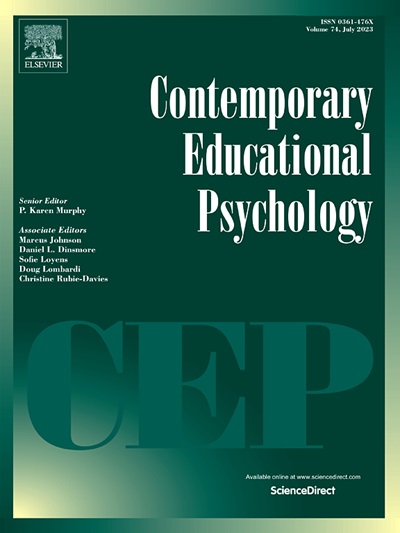教师-家长学业支持档案:与儿童在二年级和三年级坚持完成任务的关系
IF 3.8
1区 心理学
Q1 PSYCHOLOGY, EDUCATIONAL
引用次数: 0
摘要
本研究旨在确定教师和家长为儿童提供的学业支持(帮助频率、积极情感和自主支持),并在控制儿童性别、学业成绩和家长教育水平后,研究这些支持与儿童在二年级和三年级坚持完成任务的关系。共有 614 名儿童参与了研究(48% 为女孩)。他们的父母(n = 576)报告了三年级结束时(T2)在家里得到的学业支持。他们的老师(人数=40)则对他们在三年级结束时(T2)为班上每个孩子提供的学业辅导进行评分。在每次测量时(T1 和 T2),教师都会对儿童的任务坚持性进行评分。首先,通过潜特征分析,确定了三年级(T2)时教师和家长在学业支持方面的四种特征:教师积极情绪高(37.5%);教师帮助、自主和积极情绪一般(26.3%);教师积极情绪中等偏低(32%);教师积极情绪非常低(4.2%)。其次,研究结果表明,二年级时越是坚持不懈的儿童,三年级时越有可能属于教师-家长学业支持类型,其特点是帮助程度较低、自主性一般、积极情感较高。第三,对于属于教师积极情绪高的儿童,他们在二年级和三年级之间的任务坚持性有所提高。本文章由计算机程序翻译,如有差异,请以英文原文为准。
Teacher-Parent academic support profiles: Links to Children’s task persistence in Grades 2 and 3
This study aimed to identify profiles of academic support (help frequency, positive affect, and autonomy support) that teachers and parents provide for children and examine their associations with children’s task persistence in Grades 2 and 3 after controlling for children’s gender, academic performance, and parents’ educational level. Altogether, 614 children participated in the study (48 % girls). Their parents (n = 576) reported on academic support at home at the end of Grade 3 (T2). Their teachers (n = 40) rated academic support that they provided for each child in their class at the end of Grade 3 (T2). At each measurement occasion (T1 and T2), teachers rated children’s task persistence. First, latent profile analysis identified four teacher-parent academic support profiles in Grade 3 (T2): High teacher positive affect (37.5 %); Average help, autonomy, and positive affect (26.3 %); Moderately low teacher positive affect (32 %): and Very low teacher positive affect (4.2 %). Second, the results indicated that the more persistent children were in Grade 2, the more likely they were to belong to teacher-parent academic support profiles characterized by lower help, average autonomy, and higher positive affect in Grade 3. Third, for children belonging to the High teacher positive affect profile, task persistence improved between Grades 2 and 3.
求助全文
通过发布文献求助,成功后即可免费获取论文全文。
去求助
来源期刊

Contemporary Educational Psychology
PSYCHOLOGY, EDUCATIONAL-
CiteScore
16.50
自引率
3.90%
发文量
74
期刊介绍:
Contemporary Educational Psychology is a scholarly journal that publishes empirical research from various parts of the world. The research aims to substantially advance, extend, or re-envision the ongoing discourse in educational psychology research and practice. To be considered for publication, manuscripts must be well-grounded in a comprehensive theoretical and empirical framework. This framework should raise critical and timely questions that educational psychology currently faces. Additionally, the questions asked should be closely related to the chosen methodological approach, and the authors should provide actionable implications for education research and practice. The journal seeks to publish manuscripts that offer cutting-edge theoretical and methodological perspectives on critical and timely education questions.
The journal is abstracted and indexed in various databases, including Contents Pages in Education, Australian Educational Index, Current Contents, EBSCOhost, Education Index, ERA, PsycINFO, Sociology of Education Abstracts, PubMed/Medline, BIOSIS Previews, and others.
 求助内容:
求助内容: 应助结果提醒方式:
应助结果提醒方式:


